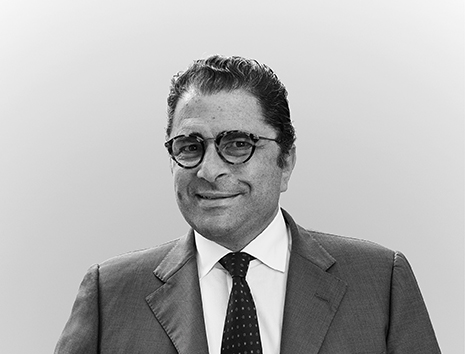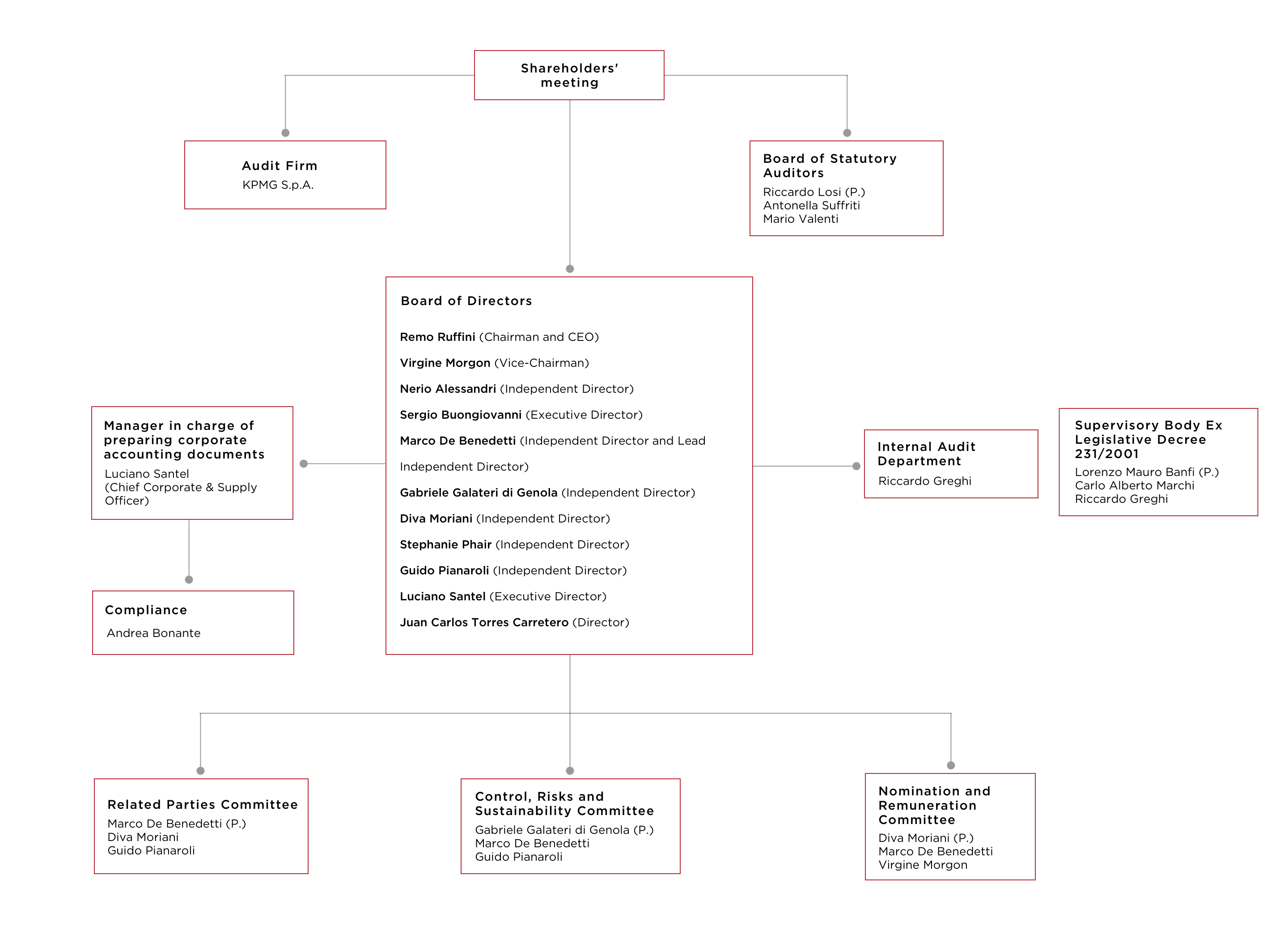THE NEW MONCLER INVESTOR RELATIONS APP IS NOW AVAILABLE
THE NEW MONCLER INVESTOR RELATIONS APP IS NOW AVAILABLE



For the transmission and storage of the Regulated Information, the Company uses the transmission system E-MARKET SDIR and the storage device E-MARKET STORAGE which can be consulted on the website www.emarketstorage.com and are managed by Teleborsa S.r.l. , with registered office in Rome, at 4 Piazza Priscilla, as per CONSOB authorization and resolutions n. 22517 and 22518 of 23 November 2022.

The Code of Ethics and corporate policies are one of the pillars of the Moncler Group’s corporate governance system and govern the decisions and the conduct of the Moncler and Stone Island brands and of their employees towards their stakeholders.
The Codes of Ethics currently adopted by Moncler and Stone Island encompass the set of values that both Brands recognise, share and promote, in the knowledge that conduct inspired by the principles of diligence, honesty and loyalty is an important driver of economic and social development. Employees and partners are required to act with honesty, passion and integrity and to build relationships with stakeholders based on mutual trust, so that growth is guided by the principle of shared value.
The Codes are periodically updated in order to align them with the international best practices and to integrate them with emerging sustainability issues. Both Codes are inspired by the main existing national and international regulations on corporate social responsibility, corporate governance, human rights and the environment, such as the United Nations Universal Declaration of Human Rights, the Charter of Fundamental Rights of the European Union, the decent work standards set out in the ILO (International Labour Organisation) conventions and the OECD (Organisation for Economic Cooperation and Development) Guidelines for Multinational Enterprises. The Codes of Ethics evoke the key principles set out both in the Supplier Code of Conduct and Group’s policies, including the Anti-Corruption Policy, Environmental Policy, Human Rights Policy1, the Occupational Health and Safety Policy, the tax policy and HR management policy, as well as the financial and asset protection policies.
The Codes of Ethics apply to all employees, suppliers, contractors, consultants, partners, and external collaborators of the two Brands, and apply in a consistent manner across all countries where Moncler and Stone Island operate. The documents are available in Italian and English, as well as in Romanian for the Moncler Code of Ethics, and set out the principles and guidelines that inspire the way in which the Brands operate every day and guide the behaviour of employees and others who work with them in various ways in performing their activities and responsibilities. The Codes are brought to the attention of employees in the most appropriate manner, in accordance with local customs. The documents can be freely downloaded from the company’s intranet and internet sites. An online training programme on the contents of the Code of Ethics is regularly provided for all Moncler employees, including temporary and part-time employees, in order to ensure a proper understanding and virtuous behaviour consistent with the requirements of the Code of Ethics, while Italian Stone Island employees are trained on these issues through a specific module dedicated to the Code within the 231 Model course.
Together with the Anti-Corruption Model, the Codes of Ethics are a fundamental and integral part of the Organisation, Management and Control Models adopted by Moncler and Stone Island pursuant to Legislative Decree 231/2001. Both Models take the form of a set of principles and rules of conduct, operating procedures and disciplinary codes, aimed at preventing the commission of offences and ensuring ethical conduct by those who operate on behalf of Group companies, in compliance with the principles of legitimacy, fairness and transparency.
Compliance with the Codes of Ethics and the Model is monitored by the appropriate supervisory and control bodies of the two Brands, through specific audits and investigations, launched on the basis of reports of conduct not in compliance with the principles of conduct required by Moncler and Stone Island. The results of verifications may lead to disciplinary actions which, depending on the severity of violation, may lead to the termination of the professional or business relationship.
The Supervisory Body, which is the entity responsible for supervising the adequacy and compliance of the Organisation, Management and Control Model and its inspiring principles in Italy, is a collegial body consisting of three members of a mixed composition of professionals, both internal and external to the company, two of whom have accounting and legal expertise, and by the head of the Group Internal Audit function. This body is placed at the top of the Company’s organisation, reporting directly to the Board of Directors of the Company to which it belongs, in order to guarantee autonomy from all forms of potential interference.
The Moncler and Stone Island Organisation, Management and Control Models are periodically updated in the light of regulatory and organisational changes. In particular, in 2022 a risk assessment was carried out to update the models, incorporating new offences such as offences involving payment instruments other than cash and offences against cultural heritage.
In the control activities carried out by the Internal Audit function, which operates at Group level, in 2022 with regard to the Italian companies of Moncler and Stone Island, checks were carried out on significant corporate processes (payments, purchases, services and consultancy, missing products, quality control, charge-backs to suppliers, sales, receipts, credit management, recruiting, etc.), as well as on the main areas identified as “sensitive” within the Model. With regard to the Group’s foreign subsidiaries, in 2022 the Internal Audit function carried out checks and tests on the adequacy of the internal control system and financial reporting procedures for companies operating in Korea, Japan, the United States and Türkiye, including to identify and/or prevent potential fraudulent conduct.
As part of management of store operations (management of receipts and sales, management of stock, protection of company assets and prevention of theft), the Internal Audit department draws up a thorough annual plan of audits at stores. Stores are generally selected according to criteria of significance of revenues, risk indicators and geographical diversification. During the year, the function continuously monitored the inventories, missing products detected during product handling and at the warehouses and compliance with the sales procedure. In particular, for Stone Island stores in Italy and the United States, ad hoc audits were carried out in 2022 on the correct implementation of store procedures following the migration of the sales management system already implemented at Moncler stores.
In addition, in order to ensure compliance with the principles and rules of conduct set out in the Code of Ethics, there are various compliance audits, including, for example, ethical and social audits along the supply chain, periodic checks carried out to obtain social and environmental certification, third-party audits on information systems and analyses by external laboratories qualified to verify the chemical compliance of products with Company standards and applicable legislation.
For both Moncler and Stone Island, a whistleblowing system is in place at the Group level, with the aim of accurately manage and quickly detect any illegal and disrespectful conduct – reported by employees or external parties – with regard to internal rules, regulations, procedures and values, and take appropriate steps, while ensuring the anonymity of the whistleblower. Any employee who, in good faith, reports an alleged or actual anomalous violation of the Code is protected from retaliation, discrimination or penalisation. The platform makes it possible for the whistleblower to choose anonymity: in this case, communications through the platform between the whistleblower and the Group, via Web or dedicated telephone lines, take place solely through a unique code identifying the report.
However, this is without prejudice to the legal obligations and the protection of the rights of the Companies or of people accused wrongly and/or in bad faith. The Moncler Group has provided whistleblowers with an ad hoc web platform and telephone lines – managed by a specialised third party and available at all times at the global level – for recording and managing reports from employees, suppliers, clients and counterparties of all the Group companies. The Web platform is available in Italian, English, Chinese, Japanese, Korean, French, German, Turkish, Arabic and Romanian, while the telephone operators speak the language of all the countries where the Group is present through its network of stores. The platform ensures, inter alia, full compliance with international privacy regulations (processing of sensitive and personal data). In early 2023, the Group planned a timely update of the rules for whistleblowing management in light of the changes occurred in Italian legislation transposing the European Directive aimed at providing greater protection of whistleblowers against retaliatory behaviour.
The whistleblowing procedure was circulated to all employees and is available on the two Brands’ company intranet. All Group employees, through an ad hoc email, and human resources managers of the Moncler Regions, through one-to-one meetings or video conferences, were made aware of the importance of whistleblowing and reporting methods.
Management of the Group’s whistleblowing channels was entrusted to the head of Internal Audit, who was responsible for reporting what was tracked and monitored through these channels directly to the Board of Directors at least every six months.
In particular, once a report has been received through whistleblowing channels the Head of Internal Audit receives and promptly analyses all the information;
Depending on the type of alleged violation, the Head of Internal Audit is responsible for sharing the report with any directly interested functions; in particular, in the case of alleged violations in the area of discrimination and harassment, they are shared and handled with the Human Resource function of the relevant region.
If the issue raised is very serious or complex, the Head of Internal Audit has the task of starting an immediate investigation, also requesting the support of other corporate functions, including Legal, Human Resources, ICT and Sustainability, as well as competent external consultants, in order to conduct investigations and controls aimed at understanding what happened. Where appropriate in relation to the seriousness of the incident, immediate measures are put in place, up to termination of the contract with the employee.
During the year, although no significant reports were received through the whistleblowing system, 13 reports2 were received through communications addressed to the Human Resources department regarding potential violations of the Code of Ethics that upon investigation were determined to be actual violations of the Code of Ethics: three cases of internal theft of certain products from stores, nine cases of inappropriate behaviour towards colleagues or customers and one of discriminatory behaviour. In five cases, the employment relationship was terminated and, in the others, disciplinary actions were implemented.
Finally, the Group has established a series of processes to verify compliance with the principles defined in the Code of Ethics through third-party certifications and audits. In particular, in light of the variety of issues covered within the Code of Ethics and the extent of its scope of applicability, the Group has established specific verification mechanisms for each principle. For example, the Code of Ethics defines the principles in the area of health and safety that the Group expects to be adhered to in all internal and external operations, and Moncler verifies compliance with these principles by conducting continuous third-party audits in order to maintain the ISO 45001 certification of its health and safety management system; moreover, the Code of Ethics defines the principles that the Group is committed to respect in its relationship with suppliers and for animal welfare, and Moncler conducts periodic third-party audits of suppliers to verify compliance with these principles. The same happens in the case of the principles defined for privacy, compliance with which is verified by Moncler through audits by third-party specialized companies on the data protection system of employees, customers, suppliers and other third parties data and, in general, on the Group’s corporate privacy compliance system. Through these third-party audits on specific sections of its Code of Ethics, the Group verifies compliance of the entire system.
Anti-Corruption Model
In 2021 a Group-wide Anti-Corruption Model was adopted, approved by the Board of Directors and based on a targeted risk assessment and a regulatory analysis of corruption offences in the countries in which the Group operates, selected on the basis of the sales revenues and Corruption Perception Index of the country. This resulted in the identification of areas of theoretical corruption risk, of the existing internal controls and those to be enhanced, and in the formulation of a Group Anti-Corruption Policy setting out the guiding principles and controls that Group employees, partners and other counterparts are required to implement to prevent corruption incidents.
In particular, the Policy lays down: (i) regulatory monitoring responsibilities; (ii) management and reporting of cases of non-compliance; and (iii) specific measures to control corruption risk.
The Company updates this risk assessment annually to review the corruption risk profiles identified. On this basis, the following areas have been identified as potentially exposed to corruption risk:
• relations with the public administration
• relations with suppliers and external consultants
• relations with agents and intermediaries
• relations with business partners for joint ventures and directors
• management of donations/sponsorships/gifts and samples
• human resources management.
For each of the above-mentioned areas, principles of conduct and operating rules have been formulated in both the Anti-Corruption Policy and in the Group’s Codes of Ethics, as well as in the policies governing behaviour to be held when carrying out activities relating to the areas mentioned above. The policies and procedures of the Group’s Anti-Corruption Model have been circulated and shared globally. An ad hoc training is also regularly provided to all employees in Italy through the e-learning platform.
The Internal Audit function periodically carries out on-site audits at Group companies in order to verify the adoption of controls to mitigate corruption risk in the areas identified as most at risk. In particular, annual audits are carried out on sponsorships, donations and gifts, management of consultants and professional assignments, acquisition and management of public grants and financing, employee recruitment, supplier management, payments, expenses and entertainment costs.
During these audits, the various departments involved are made aware of the importance of complying with the established control protocols. Audit results are shared with the Control, Risk and Sustainability Committee and the Supervisory Bodies of the Moncler brand and Stone Island brand. At least every six months, the Board of Directors receives and assesses the results of the audit activities carried out by the Group Internal Audit function. No cases of corruption were reported during 2022.
Supplier Code of Conduct
The Supplier Code of Conduct, adopted at Group level, outlines the Company’s expectations in relation to the main areas of the responsible sourcing process and is composed of six sections that establish binding rules for: Labour and Human Rights, Health and Safety, Environment, Animal Welfare, Quality and Safety of Products and Services, Business Ethics and Protection of Intellectual Property. Moncler requires its suppliers and sub-contractors to strictly comply with the principles set forth in the Code of Conduct and also commits to train and raise awareness of these provisions, both within its internal departments and among suppliers, through meetings at corporate sites or at suppliers’ premises. The Group also regularly conducts third-party audits throughout the supply chain to verify compliance with the principles contained in the Code of Conduct.
Since 2017 Moncler has also been publishing an annual Modern Slavery Statement in order to transparently communicate its approach to the management of human rights. In particular, the document describes the measures taken to ensure, as required by the laws of the United Kingdom and the California “Modern Slavery Act 2015 – Section 54”, the absence of all forms of “modern slavery, forced labour and human trafficking” within its direct scope and along its supply chain.
NOTES
1 Adopted in February 2023.
2 The 2022 Consolidated Non-Financial Statement sets out all the cases that led to a report of violations in all areas of the Code of Ethics, including human rights violations.